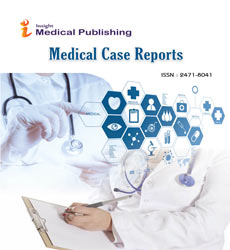Moebius syndrome
Alfred Roy*
Alfred Roy*
Department of Internal Medicine, University of East London, UK
- *Corresponding Author:
Received Date: August 30, 2021; Accepted Date: September 13, 2021; Published Date: September 20, 2021
Citation: Roy A (2021) A Short Commentary on Moebius syndrome. Med Case Rep Vol.7 No.9.204
Introduction
Moebius syndrome is a neurological disorder characterized by weakness or paralysis of cranial nerves, usually the 6th (abducens) and 7th (facial) nerves. Remaining cranial nerves are sometimes affected. This disease occurs at the time of birth (birth). When the 7th sensory is affected, a person with this syndrome cannot smile, squint, hold the lips, raise eyebrows, or close the eyebrows. When 6th sense is affected, the eye cannot look beyond the midline. Other side effects include poor pectoral muscle development and limb paralysis and the cause is unknown. It seems to happen randomly (occasionally) in most cases. However, if cases occur in families that suggest that there may be a genetic component.
Moebius syndrome signs and symptoms vary greatly from person to person. Classically accepted diagnostic methods include: 1) Facial deformity or weakness affecting at least one but usually both sides of the face (7th cranial nerve), 2) Sideways (lateral) paralysis of the eyes (6th cranial nerve); Gradually, other cranial nerves, including the 5th, 8th, 9th, 10th, 11th, and 12th may be affected.
Infants with Moebius syndrome can be very dripping and show strabismus. As the eyes do not move from side to side, the child is forced to turn his head and follow things. Infants who do not have facial expressions are often described as having very similar facial expressions when laughing or crying. Affected infants may also have difficulty eating, including swallowing problems and poor digestion.
There are many different types of abnormal conditions. Some children with Moebius syndrome have a short, deformed tongue and / or an unusually small jaw (micrognathia). These defects contribute to nutrition and difficulty breathing. Children with a palate cleft are more likely to be infected with ear infections (otitis media). There may be external ear defects including microtia or the complete absence of the outer ear (anxia). If the 8th cranial sensor is affected, there may be hearing loss. Dental abnormalities are rare. Some affected children have difficulty speaking and delays in speech development.
Leg deformity occurs in more than half of the children with Moebius sydrome. Lower limb deformities include bent legs and underdevelopment of lower legs; the upper extremities may have syndactyly itching, underdevelopment or lack of fingers, and / or underdevelopment of the hand. In a few children there may be abnormal spinal curvature (scoliosis), and in about 15% of patients with underdeveloped pectoral and chest muscles on the other side is also possible.
Some affected children show delays in reaching important steps such as crawling or walking, which may be more likely due to weakness of the upper body; however, many children end up holding on. Moebius syndrome is rarely associated with minor intellectual disabilities. Some children are classified as "autistic spectrum". Some studies have suggested that autism spectrum disorders occur more frequently in children with Moebius syndrome; some studies have not yet confirmed this and suggest that any such relationship is overstated. Moebius syndrome is often associated with a wide range of social and psychological consequences. Lack of facial expressions and inability to smile can cause viewers to misinterpret the affected person thinks or feels or intends to do. Although clinical anxiety and depression are less common in children and adolescents with Moebius syndrome, affected people may avoid social situations because of fear and frustration.
Many cases of Moebius syndrome occur randomly for unknown reasons (occasionally) if there is no family history of the disease. The disease is listed as Online Mendelian Inheritance (OMIM) No. 15700, with a genetic map area of 13q12.2-q13. Abnormal mutations in the PLXND1 and REV3L genes have also been identified in a number of patients and have been confirmed to result in a collection of Moebius syndrome-related findings.
In rare cases, family patterns have been reported. Most likely, Moebius syndrome is multifactorial, meaning that both genetic and environmental factors play a role in the cause. It is possible that in different cases there are different causes (heterogeneity).
In family cases, there is evidence that Moebius syndrome is inherited as a prominent autosomal trait. Outstanding genetic problems occur when only one copy of an unusual gene is needed for the disease to develop. An abnormal gene may be inherited from each parent, or it may be the result of a new mutation (genetic mutation) in the affected individual. The risk of transmitting abnormal genes from the affected parent to the offspring is 50% in each pregnancy regardless of the sex of the future baby.
The spectrum of findings in Moebius syndrome suggests the developmental defects of the posterior brain. Several different theories have been explained the cause of Moebius syndrome. Another theory is that the disorder is the result of reduced or impaired blood flow (ischemia) in a developing baby during pregnancy (uterus). Recent research suggests that anemia affects certain areas of the lower brain that contain cranial nerve nuclei.
Acknowledgement
None
Conflict of Interest
The author declared that there is no conflict of interest.

Open Access Journals
- Aquaculture & Veterinary Science
- Chemistry & Chemical Sciences
- Clinical Sciences
- Engineering
- General Science
- Genetics & Molecular Biology
- Health Care & Nursing
- Immunology & Microbiology
- Materials Science
- Mathematics & Physics
- Medical Sciences
- Neurology & Psychiatry
- Oncology & Cancer Science
- Pharmaceutical Sciences
